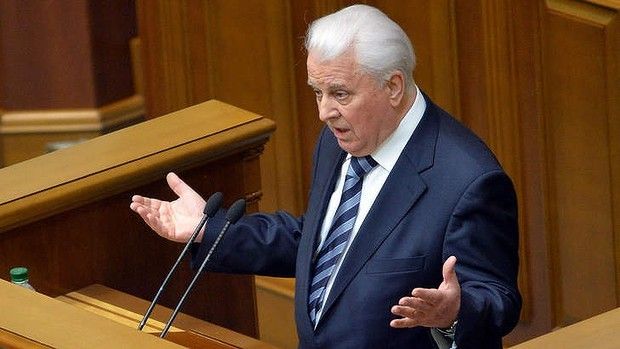
Zelenskyy Appoints Gerontocrats to Negotiate With Russia in Minsk (Part One)
Publication: Eurasia Daily Monitor Volume: 17 Issue: 118
By:

President Volodymyr Zelenskyy has appointed former president Leonid Kravchuk as chairperson of Ukraine’s delegation to the Minsk Contact Group, the forum that negotiates solutions to Russia’s undeclared war against Ukraine. Concurrently, Zelenskyy has appointed former prime minister Vitold Fokin as a member of this delegation. Kravchuk and Fokin are 86 and 88 years old, respectively.
Kravchuk replaces former president Leonid Kuchma, who has retired from the position of delegation chief, citing fatigue. Kuchma was 76 when then-president Petro Poroshenko appointed him in 2014 to head the Ukrainian delegation to the Minsk Contact Group. While Kuchma could draw on solid international diplomatic experience for this assignment, Kravchuk and Fokin are basically Ukrainian parochial figures.
An erstwhile secretary of the Ukrainian Soviet Socialist Republic’s (SSR) Communist Party Central Committee, responsible for ideology and propaganda, Kravchuk switched sides to the patriotic forces in 1990 to become the founding father of the Ukrainian independent state and its first president (1991–1994). His track record after that is a checkered one, with maneuvers between variegated political camps (a customary practice in Ukrainian politics), in the shadow of the respective party leaders, and without international exposure. In his advanced years, Kravchuk became a sought-after, deferentially treated participant in talk shows on Ukrainian channels. He has a reputation for caution, cunning, and (in his own description) “sneaking in-between raindrops.” Kravchuk’s late-blooming popularity on TV almost certainly counted in the Zelenskyy Presidential Office’s decision to appoint him.
Fokin, erstwhile a high official of the Ukrainian SSR’s State Planning Committee in 1971–1990 (its chairperson, 1987–1990), became the first prime minister of independent Ukraine (1990–1992). Fokin’s government is remembered for its disastrous economic policies, held responsible for mass pauperization at that time. He has lived in obscurity from 1992 to date.
What caused President Zelenskyy and his Office chief, Andriy Yermak (who has the say on all top personnel decisions and is, moreover, in charge of the conflict-resolution negotiations) to appoint such antiquated figures as Kravchuk and Fokin, whose past work experience hardly qualifies them for these posts? What are Kravchuk’s and Fokin‘s own views on this war? And what roles are they expected to play in the Minsk negotiations and parallel processes?
Ukrainian pundits have widely noted that Zelenskyy finds comfort in bringing representative figures of the pre-2014 order (of which the president’s circle is itself a product) back into the system of power, as the recent appointments of Oleh Tatarov or Sviatoslav Piskun also exemplify. Additionally, Zelenskyy and Yermak tend to select under-qualified personnel for government posts, expecting such appointees to be dependent or controllable (Ukraiynska Pravda, August 7; Censor.net, August 6, 8).
To be sure, Kravchuk and Fokin will be serving pro bono, and their advanced age may entitle them to their own independent judgments (see Part Two). But the same age factor will set physical limits to their activities in the Minsk Contact Group, and equally inevitably abridge their term of service in these talks. Whatever initiatives or projects the two of them may undertake, they may well be overshadowed by a sense that they cannot be there much longer anyway. They will be treated with outward respect but perhaps not taken entirely seriously by the professionally trained Russian representatives.
Kuchma, who is younger than Kravchuk and Fokin, reportedly became exhausted by the flights to Minsk and the nervous strain of the negotiations. He resigned in 2019, but Zelenskyy asked him to return as a stop-gap measure. According to Ukrainian delegates who joined the Minsk Contact Group in May 2020, Kuchma has not been seen attending the video-sessions in person, nor has his contribution been felt in any way (Dzerkalo Tyzhnia, July 28; Ukraiyinska Pravda, July 30). Kuchma’s role had all along been largely protocolary, as a top-level representative figure but not a government official. Yet Kuchma’s international diplomatic experience ensured that Poroshenko took his views into account.
While Kuchma was—and Kravchuk now is—the nominal (decorative) chief delegate, Deputy Prime Minister Oleksiy Reznikov is supposedly the real chief of the delegation to the Contact Group, with the title of deputy head of delegation. Hyperactive in this role, Reznikov has added layer upon layer to Ukraine’s Minsk delegation: deputy ministers representing various government ministries, Verkhovna Rada (parliament) committee chairs, representatives of pro-Ukraine refugees from the Russian-occupied Donetsk and Luhansk (see EDM, June 15, 17, 18, 22). Reznikov, moreover, gives frequent, lengthy interviews to Ukrainian mass media. And he generates multiple ideas about interpreting, revising, updating or circumventing the Minsk “agreements” because they do work for Russia against Ukraine. The Russian delegation, meanwhile, remains impassive and compact, lean and mean.



